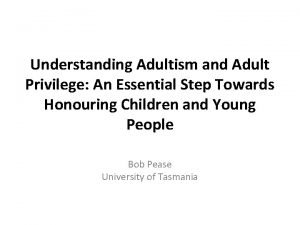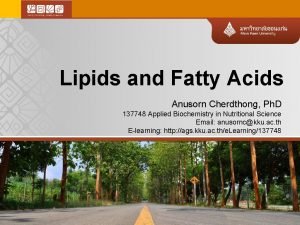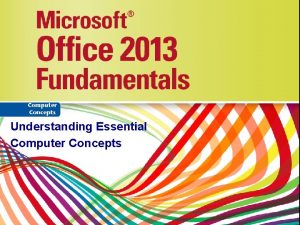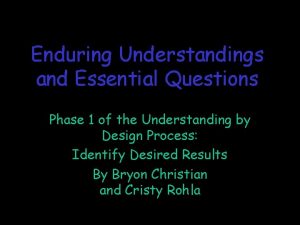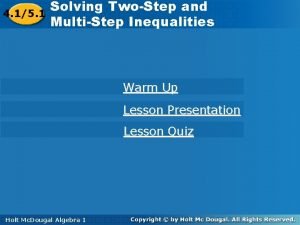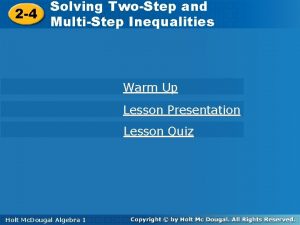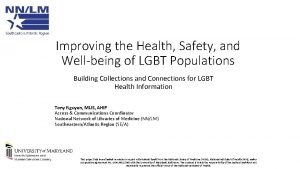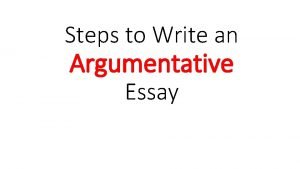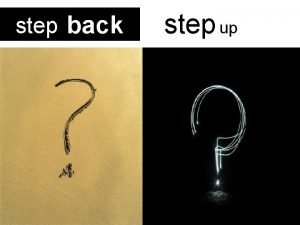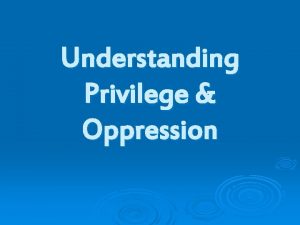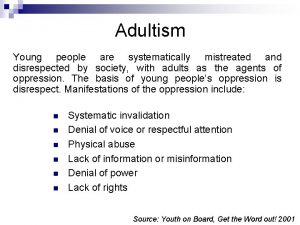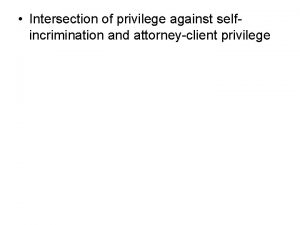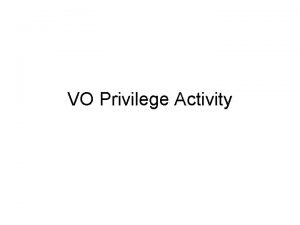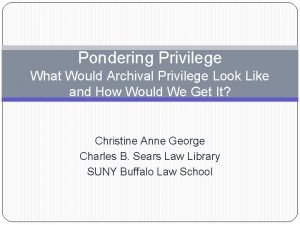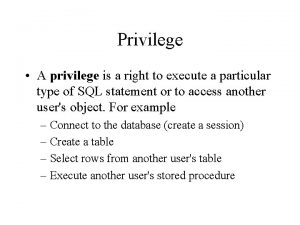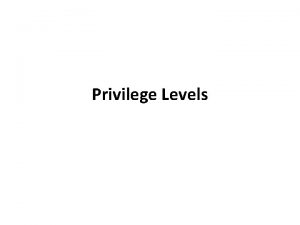Understanding Adultism and Adult Privilege An Essential Step


















- Slides: 18

Understanding Adultism and Adult Privilege: An Essential Step Towards Honouring Children and Young People Bob Pease University of Tasmania

Privilege ‘The word privilege is used to refer to systematically conferred advantages individuals enjoy by virtue of their membership in dominant groups with access to resources and institutional power that are beyond the common advantages of marginalised citizens’ (Bailey 1998: 109).

Intersecting Sites of Privilege Western Global Dominance and Eurocentrism Political Economy and Class Elitism Gender Order and the Patriarchal Dividend Racial Formations and White Supremacy Institutionalised Heterosexuality and Hetero. Privilege • Ableist Relations and the Embodiment of Privilege (Pease 2010). • • •

The Invisibility of Privilege • Most privilege is not recognised as such by those who have it. • When people are unable to recognise their privilege, they are unable to see their role in keeping other groups subordinated. Normativity • Privileged groups become the model for normal human relations. • Because the privileged are regarded as normal, they are less likely to be studied or researched because the norm does not have to be marked.

Naturalisation • Gender, race, sexuality and class are regarded as flowing from nature. • Members of privileged groups either believe that they have inherited the characteristics that give them advantages or they consciously cover up the socially constructed basis of their dominance. Sense of entitlement • Members of privileged groups believe that they have a right to be respected, acknowledged, protected and rewarded. • Members of privileged groups believe that they deserve whatever benefits and status they attain because they have struggled for them.

Issues facing children and young people • • • Physical and sexual abuse Punishment and threats Denial of legal rights Discrimination Negative media portrayals Negative community attitudes and prejudice

Adultism • ‘Adultism refers to behaviours and attitudes based on the assumption that adults are better than young people and entitled to act upon young people without their agreement’ (Bell 1995). • Describes the oppression of children and young people by adults. • Most adults do not recognise the effect of adultism on young people or themselves.

Adult Privilege Checklist As a child: • I am not allowed to vote, even though government makes decisions about me. • It is often considered acceptable, appropriate and even desirable for my caregiver to physically assault me if I do not please them. • If I am routinely yelled at, criticized and belittled in my own home, this might not generally be recognised as abusive behaviour. • I am routinely ignored or told to be quiet. • Adults often feel they have the right to harass me. • Society and the media often portray me in a negative light. • People often make decisions on my behalf and tell me they know better than I do about what is best for me. • I am not usually given a choice about my place of education. • I am not usually given a choice about what religion to follow • (Source: http: //shutupsitdown. co. uk/2009/11/16/the-adult-privilege-checklist/)

Forms of Adultism • • • Laws Child development literature and education Cultural practices Adult attitudes Institutional practices Parenting

Premises of adultism • Inferior status of children and young people is assumed to be a result of their inferior mental capacities. • Appeals to the ‘best interests’ of children and young people. • Paternalistic justifications • Subordination is constructed as biological, natural and normal • How do we distinguish between behaviour, policies and procedures that are respectful, protective and developmentally appropriate?

Biology and developmental psychology • What is the relationship between the biological and the social in age development? • Biologism: the explanation of social and psychological life with reference to biological causes. • The premise of developmental psychology is the question: How does a biological infant turn into a social being? • Entry into society is seen as a gradual move from the biological into a social being.

The social construction of childhood • Childhood at one level refers to a biological condition. But it is not inherent in biology. • Children and childhood are constructed. • Childhood is conceived of differently in different cultures and different historical periods. • Does the concept of childhood limit citizenship rights?

What does citizenship mean for children? • Should children have the right to vote? If so, which children? • Can children have a voice in society and represent themselves? If so, which children? • Should children have access to confidential medical care? At what age should parents no longer have the right to know about their children’s medical care? • In cases involving concerns about children’s well-being, especially reports of harm, are all children able to make decisions about their immediate and future safety that professionals must act upon? • What might be the ethical implications for professionals who act on children’s wishes and there is subsequent harm to the child? • What might be the legal implications in terms of professional liability and duty of care towards the child and other interested parties? (D’Cruz and Stagnitti 2005).

The social construction of adolescence • Adolescence is a term describing a series of developmental stages that it is assumed all people go through. • Adolescence is the period in the life course in which individuals are seen to be most likely alienated. • Adolescence is seen as a ‘hormonal time bomb’ and full of ‘raging hormones’. • Adolescence as a myth.

Objections to calling adultism a form of oppression • The biological state of being young is temporary. • The legal status of being young is temporary. • Age is a continuum. • All human beings are young at one time. • Children and young people are dependent on adults. • Nearly every child goes on to become and adult.

Experiences of children and young people • Do children and young people believe themselves to be part of a subordinated group? • Research demonstrating children’s and young people’s experiences of age inequality. • Children’s rights movements

Intersectionality and adultism • Age categories are presented as uncovering truths about all children. • Different cultural, ethnic, gender, class and religious approaches complicate the concept of adultism. • Adultism is intersected with other social locations.

Challenging adultism • • Teaching adults about adultism Unlearning adultism Adults as allies Youth-led movements
 Step 1 step 2 step 3 step 4
Step 1 step 2 step 3 step 4 Adultism
Adultism What is an enduring understanding
What is an enduring understanding Characteristics of lipids
Characteristics of lipids Essential questions opening doors to student understanding
Essential questions opening doors to student understanding Types of printers
Types of printers Enduring understanding examples
Enduring understanding examples Negative cosine graph
Negative cosine graph How to solve two step inequalities
How to solve two step inequalities Solve two-step inequalities
Solve two-step inequalities John hopkins diversity wheel
John hopkins diversity wheel Disking primary teeth
Disking primary teeth Dino the dinosaur text structure
Dino the dinosaur text structure Informative essay steps
Informative essay steps Persuasive essay sentence starters
Persuasive essay sentence starters Step back step up
Step back step up Solve
Solve 2 systems of equations calculator
2 systems of equations calculator Simultaneous equations step by step
Simultaneous equations step by step

